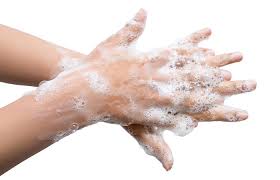How to Wash Your Hands Properly
Learning how to wash your hands properly is very important. The number one way to prevent the spread of germs and bacteria is by proper and frequent handwashing. By washing your hands, you can avoid getting a cold, the flu and other diseases.
When to Wash Your Hands
Think of all the things your hands touch during the day. Germs from these surfaces accumulate on your hands and then can spread to your eyes, nose and mouth. While it isn’t possible to keep your hands completely free of germs, you can limit the transfer of germs.
You should always wash your hands before:
- preparing food or eating
- treating wounds or caring for a sick person
- putting in or taking out contact lenses.
You should always wash your hands after:
- if they look dirty or feel sticky
- using a toilet or changing a diaper
- preparing food, particularly raw meat or poultry
- touching an animal or its things like toys, leashes, harnesses, clothing
- picking up dog poop
- blowing your nose
- coughing or sneezing into your hands
- treating wounds or caring for a sick person
- shaking hands with someone
- handling garbage, chemicals, dirty laundry, soiled shoes
Steps for How to Wash Your Hands Properly
- Under clean running water (warm or cold), wet your hands
- Turn off the water (think of the environment and save water!)
- Apply soap to your hands. Soap can be liquid, bar or powder.
- Lather the soap and rub your hands together for more than 20 seconds, being sure to scrub all surfaces including backs of hands, wrists, between fingers and under fingernails
- Turn water back on and rinse hands well
- Turn water off using the back of your hand or a towel
- Dry your hands with an air dryer while rubbing hands together, or use a towel
Does Water Temperature Matter?
In order to kill bacteria, the water temperature has to be really hot, much hotter than our skin can handle. Therefore, water temperature is not really a factor when washing hands. More important is the use of clean water, soap, scrubbing action and drying.
A Tip for Children
When teaching young children how to wash their hands, try suggesting they sing the Happy Birthday song while washing their hands. When the song is over, they are finished washing their hands properly.
Hand Sanitizer
Hand sanitizer is an alcohol-based cleanser that doesn’™t require water to properly clean your hands. When using hand sanitizer, it is important to rub all the surfaces of your hand as you would when washing with soap and water. Hand sanitizers come in a variety of sizes, including travel sizes, so it is easy to take hand sanitizer with you and always be able to clean your hands even if you don’t have access to soap and water.
Washing your hands properly prevents the spread of disease and infection, helping you and the people around you to stay healthy.

